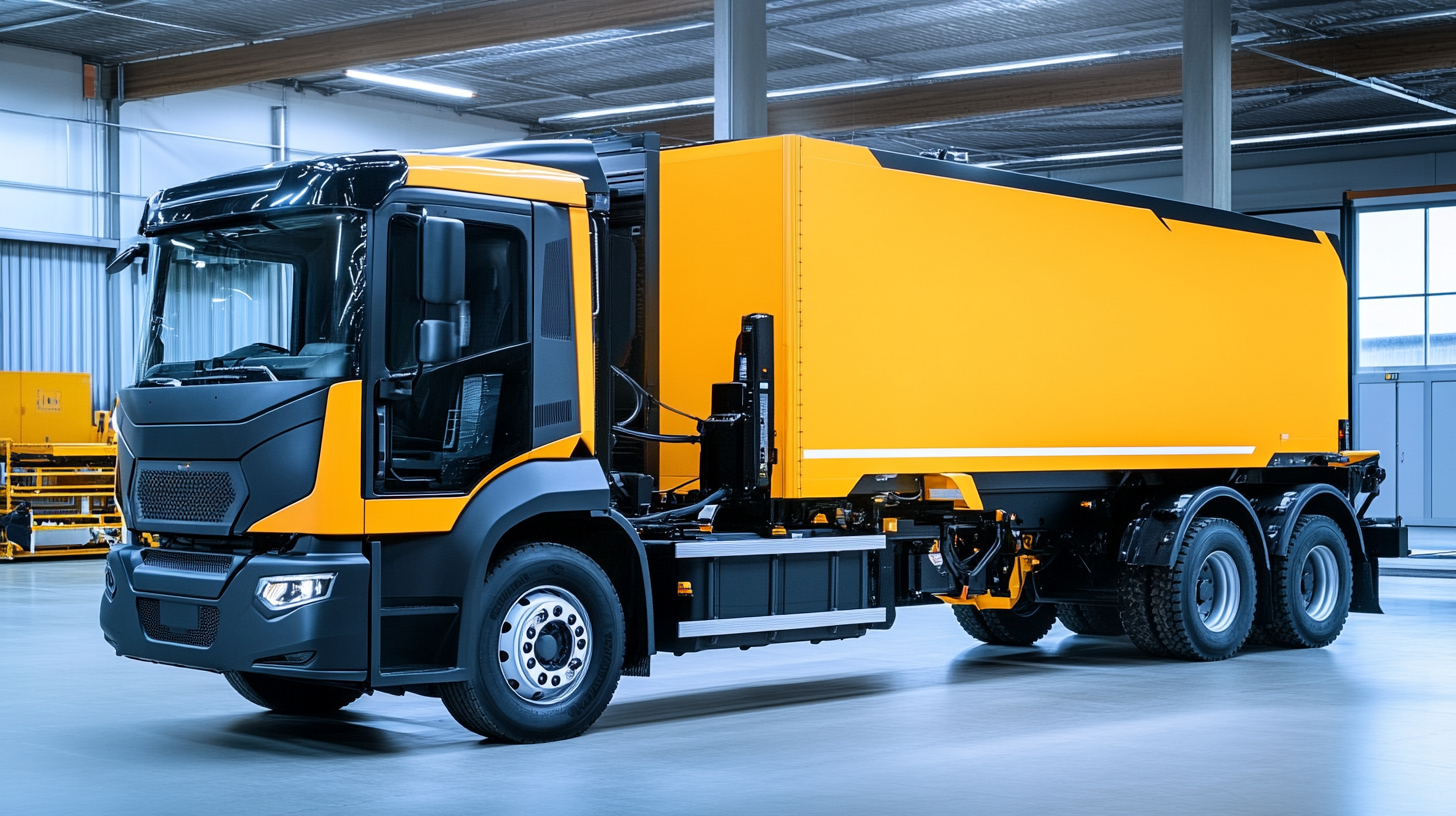Sorry. We did not find anything.
7 Essential Benefits of Choosing Electric Heavy Duty Trucks for Your Business
In recent years, the transportation industry has witnessed a significant transformation driven by the need for sustainability and efficiency. Electric Heavy Duty Trucks are at the forefront of this revolution, offering businesses a viable alternative to traditional diesel-powered vehicles. As companies increasingly prioritize reducing their carbon footprint and lowering operational costs, the adoption of Electric Heavy Duty Trucks is becoming an attractive proposition. This shift not only benefits the environment but also sets a foundation for a more sustainable future in logistics and transportation.
Choosing Electric Heavy Duty Trucks for your business can provide a range of benefits that extend beyond simple compliance with environmental regulations. From reduced fuel expenses and maintenance costs to enhanced performance and reliability, these electric vehicles are proving to be an intelligent investment for forward-thinking companies. As we explore the essential benefits of Electric Heavy Duty Trucks, it becomes clear that they represent not just a technological advancement but a strategic move that can drive efficiency and profitability for your business in an evolving marketplace.

The Environmental Impact: How Electric Trucks Contribute to a Greener Future
Electric heavy-duty trucks are revolutionizing the logistics and transportation sectors, offering significant environmental benefits that are paramount for a sustainable future. One of the most critical impacts of transitioning to electric trucks is the substantial reduction in greenhouse gas emissions. Traditional diesel trucks contribute heavily to air pollution and climate change, whereas electric trucks produce zero tailpipe emissions. This shift is crucial as industries grapple with increasing environmental regulations and the pressing need to reduce their carbon footprints. Furthermore, electric heavy-duty trucks enhance energy efficiency, translating into lower operational costs and reduced reliance on fossil fuels. Utilizing renewable energy sources for charging, these trucks can operate with minimal ecological impact, promoting a cleaner energy transition. As businesses adopt electric vehicles, they also contribute to decreasing noise pollution, thus improving the quality of life for communities near transportation hubs. This silent operation not only benefits urban environments but also enables freight operations to run even during off-hours, maximizing efficiency while minimizing disruption. Investing in electric heavy-duty trucks signifies a commitment not only to efficiency but also to corporate social responsibility. Companies can enhance their brand image by taking proactive steps toward sustainability, appealing to environmentally conscious consumers. Supporting the shift towards electric trucks is not just an ethical decision; it is a strategic move that aligns with global efforts to protect the planet for future generations.

Cost Savings: Understanding the Financial Benefits of Electric Heavy Duty Trucks
When considering the transition to electric heavy-duty trucks, financial benefits play a pivotal role in the decision-making process for businesses. One of the most significant advantages is the reduction in fuel costs. Traditional diesel trucks are subject to volatile fuel prices, which can quickly escalate operating expenses. In contrast, electric trucks offer a predictable cost structure, allowing businesses to budget more effectively. With the price of electricity generally being more stable and often lower than diesel, companies can enjoy substantial savings over time.
Another key financial benefit of electric heavy-duty trucks is lower maintenance costs. Electric vehicles have fewer moving parts compared to their diesel counterparts. This translates to reduced wear and tear and fewer repairs, leading to long-term savings. Additionally, the absence of oil changes, fuel filters, and exhaust systems not only minimizes maintenance time but also lowers labor costs. Furthermore, many jurisdictions offer incentives for adopting electric vehicles, such as tax credits and grants, further enhancing the financial appeal.
Finally, as environmental regulations become stricter, adopting electric trucks can help businesses avoid potential fines associated with emissions. Operating electric heavy-duty vehicles positions companies as forward-thinking and compliant with upcoming emission standards, creating a competitive advantage in a market that increasingly values sustainability. Investing in electric trucks is thus not just a step towards environmental responsibility; it is a savvy financial decision that can lead to long-term profitability.

Enhanced Performance: The Advantages of Electric Powertrains in Heavy Duty Vehicles
Electric heavy-duty trucks are redefining the logistics and transportation sectors with their enhanced performance capabilities driven by advanced electric powertrains. A study by the International Council on Clean Transportation (ICCT) highlighted that electric trucks can achieve a reduction in greenhouse gas emissions of up to 60% compared to their diesel counterparts over their operational lifetime. This significant reduction not only meets increasingly stringent environmental regulations but also enhances the corporate responsibility image of businesses adopting these technologies.
Furthermore, electric powertrains offer superior torque and acceleration, providing immediate power delivery that is crucial for heavy-duty applications. According to research from the American Council for an Energy-Efficient Economy (ACEEE), electric trucks demonstrate a 30% increase in energy efficiency, leading to a reduction in overall operating costs. This efficiency is particularly beneficial for businesses as it translates to lower fuel and maintenance expenses over time.
Additionally, advancements in battery technology mean that electric heavy-duty trucks now have a greater range than ever before. With many models offering ranges exceeding 300 miles per charge, businesses can confidently rely on electric trucks for regional deliveries without the concern of frequent recharging. Reports project that by 2030, nearly 60% of all heavy-duty truck sales will be electric, underlining the shift towards electrification in the industry. These changes are not just enhancements; they represent a transformative shift toward a more sustainable and efficient future in transportation.

Maintenance and Longevity: Why Electric Trucks Are Easier to Maintain
When considering the transition to electric heavy-duty trucks, one crucial aspect that sets them apart from their diesel counterparts is maintenance and longevity. Electric trucks benefit from a simpler drivetrain with fewer moving parts, which translates to lower maintenance costs over their lifespan. With no oil changes, fuel filters, spark plugs, or exhaust systems to worry about, businesses can significantly reduce their routine maintenance schedules. This simplicity not only lowers operation costs but also minimizes downtime, enabling fleets to maintain productivity.
Moreover, electric trucks are designed for durability, often featuring robust components built to withstand rigorous conditions. The absence of a traditional engine means that these vehicles experience less wear and tear, leading to longer lifespans. Regenerative braking systems further enhance the longevity of brake components, reducing their replacement frequency. This durability, combined with their lower maintenance requirements, makes electric heavy-duty trucks an appealing choice for businesses looking to maximize their return on investment.
Investing in electric heavy-duty trucks also signals a commitment to sustainability. As businesses become more environmentally conscious, the longevity and reduced upkeep of electric vehicles align with corporate social responsibility goals. This forward-thinking approach not only elevates a company's reputation but also prepares it for a future where sustainable practices are paramount. By opting for electric trucks, businesses can enhance operational efficiency while contributing positively to the environment.
Regulatory Incentives: Government Benefits for Transitioning to Electric Fleets
Transitioning to electric heavy-duty trucks offers substantial benefits for businesses, especially considering the supportive regulatory environment that has developed in recent years. As cities and governments globally expand their focus on sustainable transportation, there's a noticeable shift toward incentivizing electric vehicle adoption. For example, in the Autumn Budget, numerous key announcements were made regarding tax benefits, grants, and an improved charging infrastructure, which are essential in encouraging fleet operators to consider electrification.
Government policies are pivotal in making the transition economically viable. Reports indicate that California, for instance, currently offers impressive incentives for electric truck adoption, though these benefits may diminish as new regulations roll out. With electric commercial vehicles projected to generate revenues exceeding $29.1 billion in Europe by 2029, companies have a timely opportunity to switch their fleets to electric models and align with environmental goals while maximizing savings.
Moreover, the push for zero-emission trucks is bolstered by research indicating that ten million electric vehicles were on the roads by 2020, marking a critical moment for mass-market electrification. This momentum suggests a readiness within the market for extensive electric fleet deployment, as consumers and businesses increasingly prioritize sustainability. The regulatory landscape is not just a framework for compliance; it’s an invitation to innovate, making it an essential factor for businesses aiming to thrive in a rapidly evolving marketplace.

